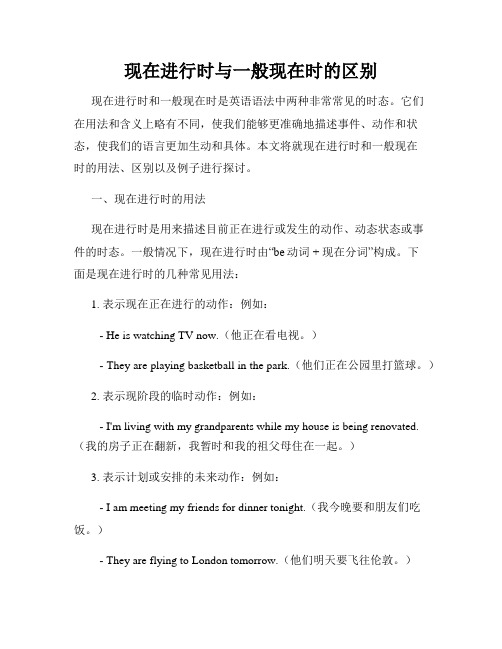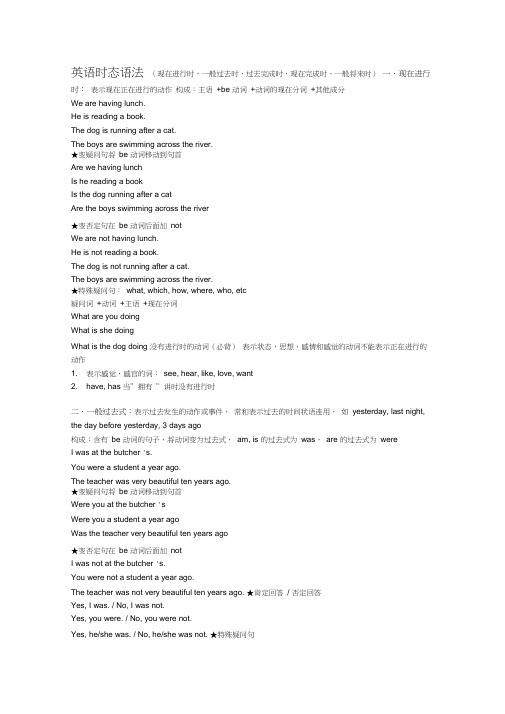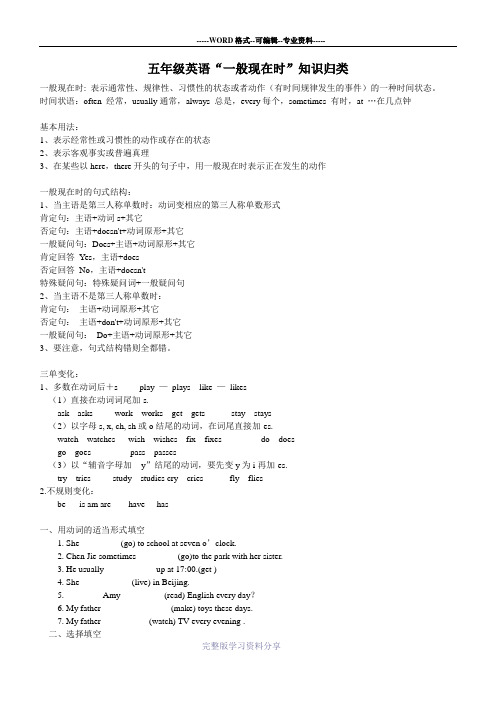一般现在时现在进行时语法(小学五年级下册)
一般现在时现在进行时语法(小学五年级下册)

1.一般现在时。
主要描述经常会发生的动作、状态或不变的真理。
句末常出现every day/week/year/Monday , in the morning, 句中常有always, usually, often, sometimes组成:(1)主语+be+名词(形容词)I am a student. He is tall.否定句:在be 后加notI am not a student. He is not tall.疑问句:be 动词提前到第一位。
Are you a student? Is he tall?Yes, I am./ No, I am not. Yes, he is./ No, he isn’t.(2)主语+动词+地点+时间(注意主语不是第三人称单数行为动词要用原形。
主语是第三人称单数,即he 、she 、it,则动词要用三单式)We go to school on Monday.He goes to the park on Sunday.否定句:主语+don’t/doesn’t+动词原形+地点+时间We don’t go to school on Monday.He doesn’t go to the park on Sunday.疑问句:在句首加do或doesDo you go to school on Monday? Yes, we do./ No, we don’t.Does he go to the park on Sunday? Yes, he does./ No, he doesn’t.动词单三变化:1. 在原单词末尾加s , 如:like – likes2. 单词以o, sh, ch, s, x 结尾加es, 如:go – goes3. 单词末尾为辅音+y结尾去y加ies 如:study- studies2. 现在进行时:主要叙述正在发生的事情。
句末常出现now, 句首常出现look, listen或一个相当具体的时间It’s….组成:主语+be +动词ing形式I am reading English.They are swimming.He is playing football.否定句:在be后加notI am not reading English.They are not swimming.He is not playing football.疑问句:将be 放到第一位。
(完整版)小学一般现在时-过去式-现在进行时-将来时讲解

四种时态的比较.不规则动词过去式:原形过去式原形过去式原形过去式原形过去式sweep swept teach taught have had go went keep kept think thought do did find found sleep slept buy bought eat ate say said feel felt drink drank is/am was take took read read give gave are were mean meantput put sing sang drive drove meet met cut cut begin began speak spoke make made let let ring rang write wrote see saw fly flew run ran ride rode come came draw drew sit sat hear heard tell toldgrow grew learn learned/learntget got know knew一、用动词的适当形式填空1. My parents _______ (come) from Shandong.2. Sam _______(not like) playing computer games.3. The beautiful girl _______(wear) glasses.4. The Zhang family _______(live) in a flat in Nanjing.5. My father likes _______(read) newspapers after work.6. What _______her classmates _______(call) her teacher?7. _______ you _______(love) each other in your family?8. _______(be) your cousin very clever at maths?9. She is good at dancing. She ________ (sing) very well, too.11. Amy ________(take) her dog for a walk every afternoon.12. Mr. Li ________(not teach) us maths this term. (学期)13. Mr. Chen ________(not like) tea. He ________(enjoy) drinking coffee.14. ________ your father often ________(play) tennis ?No, he loves ________(read) newspapers.15. Everyone in our class ________(like) P.E. a lot.16. Who else ________(want) to come to Millie’s party? I ________.17. Many of them ________(work) hard at their lessons. They _____ (be) cl ever at them.18. What _______ Mary _______(have) for breakfast ?She _______(have) an egg and a glass of milk.19. Our school ________(be) a big nice school. And our teacher ______(be ) a good teacher.20. Simon and Daniel ________(be) American.二、句型转换。
一般现在时,现在进行时语法及练习

一般现在时一.定义:表示经常性的事情,经常性的动作或一般性事实。
二.标志性词语:often经常,usually通常,always总是,every每个,sometimes有时,at…在几点钟三.动词变化:第三人称单数用动词的“三单变化”,其他用动词的原形。
三单变化:情况构成方法读音例词一般情况加-s 清辅音后读/〃浊轴音和元首后读/z/swim-swims ;help-helps ;like-likes以辅音字母+o结尾的词加-es读/z/goes,does以s,sh,ch,x 等结尾的词加-es读/iz/watches,washes 以辅音字母+y结尾的词变y为i再加es读/z/study-studies 不规则变化have和be动词变have 为has变be 为am,is,arehave-has be-am,is,are四、一般现在时的句子转换:(1)当句子中有be动词或情态动词时:提:把be动词或情态动词(can,could等等)提到主语的前面;否定句:在be动词或情态动词后面加not例:①陈述句:She is a student.疑问句—Is she a student?否定句—She is not a student.②陈述句:I can swim.疑问句—Can you swim否定句—I can not swim.(2)当句子中即没有be动词,也没有情态动词时,则在主语前加助动词do (you,以及复数),does(单数she,he,it)变成问句;在主语后谓语动词前加助动词don’t (I,you,以及复数),doesn’t (单数she,he,it)变成否定句,助动词后的动词要变成动词原形。
例:①陈述句:We get up at 7:00 every morning.疑问句—Do you get up at 7:00 every morning?否定句—We don,t get up at 7:00 every morning.②陈述句:She has a little brother.疑问句—Does she have a little brother?否定句—She doesn,t have a little brother.总结:当主语是第三人称单数时:1、动词变相应的第三人称单数形式2、肯定句主语+动词s+其它3、否定句主语+doesn't+动词原形+其它4、一般疑问句Does+主语+动词原形+其它5、肯定回答Yes,主语+does6、否定回答No,主语+doesn't7、特殊疑问句特殊疑问词+一般疑问句当主语不是第三人称单数时:1、肯定句主语+动词原形+其它2、否定句主语+don't+动词原形+其它3、一般疑问句Do+主语+动词原形+其它4、要注意,句式结构错则全都错。
(完整版)小学英语语法_四大时态

四大时态复习1. 一般现在时(1)一般现在时的构成(肯定句)☆be动词:主语+be(am,is,are)+其它。
如:I am a boy.我是一个男孩。
☆行为动词:主语+行为动词(+其它)。
如:We study English.我们学习英语。
☆当主语为第三人称单数(he, she,it)时,要在动词后加"-s"或"-es"。
如:Mary likes Chinese. 玛丽喜欢汉语。
(2)一般现在时的变化☆. be动词的变化。
[否定句]:主语+ be + not +其它。
如:He is not a worker.他不是工人。
[一般疑问句]:Be +主语+其它。
如:-Are you a student? -Yes. I am. / No, I'm not.[特殊疑问句]:疑问词+一般疑问句。
如:Where is my bike?☆.行为动词的变化。
[否定句]:主语+ don't( doesn't ) +动词原形(+其它)。
如:I don't like bread.当主语为第三人称单数时,要用doesn't构成否定句。
如:He doesn't often play.[一般疑问句]:Do( Does ) +主语+动词原形+其它。
如:- Do you often play football?- Yes, I do. / No, I don't.当主语为第三人称单数时,要用does构成一般疑问句。
如:- Does she go to work by bike? - Yes, she does. / No, she doesn't.[特殊疑问句]:疑问词+一般疑问句。
如:How does your father go to work?*动词+s的变化规则1.一般情况下,直接加-s,如:cook-cooks, milk-milks2.以s. x. sh. ch. o结尾,加-es,如:guess-guesses, wash-washes, watch-watches, go-goes 3.以“辅音字母+y”结尾,变y为i, 再加-es,如:study-studies2.现在进行时(1)一般现在时的构成:be(am,is, are)+ 动词的ing形式。
现在进行时与一般现在时的区别

现在进行时与一般现在时的区别现在进行时和一般现在时是英语语法中两种非常常见的时态。
它们在用法和含义上略有不同,使我们能够更准确地描述事件、动作和状态,使我们的语言更加生动和具体。
本文将就现在进行时和一般现在时的用法、区别以及例子进行探讨。
一、现在进行时的用法现在进行时是用来描述目前正在进行或发生的动作、动态状态或事件的时态。
一般情况下,现在进行时由“be动词 + 现在分词”构成。
下面是现在进行时的几种常见用法:1. 表示现在正在进行的动作:例如:- He is watching TV now.(他正在看电视。
)- They are playing basketball in the park.(他们正在公园里打篮球。
)2. 表示现阶段的临时动作:例如:- I'm living with my grandparents while my house is being renovated.(我的房子正在翻新,我暂时和我的祖父母住在一起。
)3. 表示计划或安排的未来动作:例如:- I am meeting my friends for dinner tonight.(我今晚要和朋友们吃饭。
)- They are flying to London tomorrow.(他们明天要飞往伦敦。
)二、一般现在时的用法一般现在时是用来描述经常、习惯性发生的动作或状态的时态。
一般情况下,一般现在时使用动词的原形。
下面是一般现在时的几种常见用法:1. 表示经常性或习惯性的动作:例如:- She drinks a cup of tea every morning.(她每天早上喝一杯茶。
) - They often go shopping on weekends.(他们经常在周末去购物。
)2. 表示普遍真理或客观事实:例如:- The sun rises in the east and sets in the west.(太阳从东方升起,从西方落下。
PEP五年级英语下册Unit1-6重点知识小结

Unit 1 This Is My Daydo morning exercises晨练eat breakfast吃早饭have english class上英语课play sports进行体育运动eat dinner吃晚饭when什么时候evening夜晚;晚上get up起床at在……点钟usually通常;一般noon中午climb mountains爬山go shopping购物;买东西play the piano弹钢琴visit grandparents看望祖父母go hiking去远足weekend周末often经常sometimes有时候话题1:日常生活时态:一般现在时1.When do you do morning exercises? 你什么时候做早操?I usually do morning exercises at 8:00. 我经常八点钟做早操。
(I usually get up at 12:00 at noon . 我经常在中午十二点起床。
) 2.When do you eat dinner ? 你什么时候吃晚餐?I eat dinner at 7:00 in the evening. 我在晚上七点种吃晚餐。
3.When is the best time to go to Beijing? Fall. 最好在什么时候去北京?秋天。
Unit 2 My Favourite Seasonspring春天summer夏天fall秋天winter冬天season季节which哪一个best最;极swim游泳fly kites放风筝skate滑冰make a snowman堆雪人plant trees种树why为什么because因为sleep 睡觉话题2:季节时态:一般现在时1.Which season do you like best ? I like spring best.(Spring.)你最喜欢是什么季节?我最喜欢春季。
小学五年级下英语语法总结

英语时态语法(现在进行时,一般过去时,过去完成时,现在完成时,一般将来时)一.现在进行时:表示现在正在进行的动作构成:主语+be 动词+动词的现在分词+其他成分We are having lunch.He is reading a book.The dog is running after a cat.The boys are swimming across the river.★变疑问句将be 动词移动到句首Are we having lunchIs he reading a bookIs the dog running after a catAre the boys swimming across the river★变否定句在be 动词后面加notWe are not having lunch.He is not reading a book.The dog is not running after a cat.The boys are swimming across the river.★特殊疑问句:what, which, how, where, who, etc疑问词+动词+主语+现在分词What are you doingWhat is she doingWhat is the dog doing 没有进行时的动词(必背)表示状态,思想,感情和感觉的动词不能表示正在进行的动作1. 表示感觉,感官的词:see, hear, like, love, want2. have, has 当”拥有”讲时没有进行时二.一般过去式:表示过去发生的动作或事件,常和表示过去的时间状语连用,如yesterday, last night, the day before yesterday, 3 days ago构成:含有be 动词的句子,将动词变为过去式,am, is 的过去式为was,are 的过去式为wereI was at the butcher 's.You were a student a year ago.The teacher was very beautiful ten years ago.★变疑问句将be 动词移动到句首Were you at the butcher 'sWere you a student a year agoWas the teacher very beautiful ten years ago★变否定句在be 动词后面加notI was not at the butcher 's.You were not a student a year ago.The teacher was not very beautiful ten years ago. ★肯定回答/ 否定回答Yes, I was. / No, I was not.Yes, you were. / No, you were not.Yes, he/she was. / No, he/she was not. ★特殊疑问句What did you do (必背)不含有be 动词的句子,将动词变为过去式I finished my homework yesterday. The boy went to a restaurant.The Sawyers lived at King Street a year ago. ★变疑问句在句首加did, 动词变为原型Did you finish your homework yesterday Did the boy go to a restaurant Did the Sawyers live at King Street a year ago ★变否定句在主语和动词之间加did not I did not finish my homework yesterday.The boy did not go to a restaurant.The Sawyers did not live at King Street a year ago. ★肯定回答及否定回答Yes, I did. No, I didn't. Yes, he did. No, he didn't.Yes, they did. No, they did not.三.过去完成时用法:在过去的时间里,两个动作中,发生在前的那个动作要用过去完成时。
五年级英语“一般现在时”知识归类

五年级英语“一般现在时”知识归类一般现在时: 表示通常性、规律性、习惯性的状态或者动作(有时间规律发生的事件)的一种时间状态。
时间状语:often 经常,usually通常,always 总是,every每个,sometimes 有时,at …在几点钟基本用法:1、表示经常性或习惯性的动作或存在的状态2、表示客观事实或普遍真理3、在某些以here,there开头的句子中,用一般现在时表示正在发生的动作一般现在时的句式结构:1、当主语是第三人称单数时:动词变相应的第三人称单数形式肯定句:主语+动词s+其它否定句:主语+doesn't+动词原形+其它一般疑问句:Does+主语+动词原形+其它肯定回答Yes,主语+does否定回答No,主语+doesn't特殊疑问句:特殊疑问词+一般疑问句2、当主语不是第三人称单数时:肯定句:主语+动词原形+其它否定句:主语+don't+动词原形+其它一般疑问句:Do+主语+动词原形+其它3、要注意,句式结构错则全都错。
三单变化:1、多数在动词后+s play —plays like —likes(1)直接在动词词尾加-s.ask---asks work---works get---gets stay---stays(2)以字母s, x, ch, sh或o结尾的动词,在词尾直接加-es.watch---watches wish---wishes fix---fixes do---doesgo---goes pass---passes(3)以“辅音字母加- y”结尾的动词,要先变y为i再加-es.try---tries study---studies cry---cries fly---flies2.不规则变化:be---- is am are have----has一、用动词的适当形式填空1. She _________(go) to school at seven o’clock.2. Chen Jie sometimes _________(go)to the park with her sister.3. He usually ___________ up at 17:00.(get )4. She ___________ (live) in Beijing.5. ________ Amy _________ (read) English every day?6. My father _______________ (make) toys these days.7. My father __________ (watch) TV every evening .二、选择填空1.I want____homework now.A. doingB. to doC. to do myD. do my2.It's time______.A. go to schoolB. play gamesC. to go homeD. to do my homeworks 3.______go and help her.A. Let's meB. Let's usC. Let'sD. Let's to4.Do they have a new car? Yes,_____.A .they are B.they have C. they don't D. they do5.He often _________ supper at 6:00 in the evening.A. haveB. has c. is having D. is eating6. We _____________ any Chinese classes on Friday.A. are havingB. aren’t havingC. don’t haveD. are have三、用括号内动词的适当形式填空。
- 1、下载文档前请自行甄别文档内容的完整性,平台不提供额外的编辑、内容补充、找答案等附加服务。
- 2、"仅部分预览"的文档,不可在线预览部分如存在完整性等问题,可反馈申请退款(可完整预览的文档不适用该条件!)。
- 3、如文档侵犯您的权益,请联系客服反馈,我们会尽快为您处理(人工客服工作时间:9:00-18:30)。
1.一般现在时。
主要描述经常会发生的动作、状态或不变的真理。
句末常出现every day/week/year/Monday , in the morning, 句中常有always, usually, often, sometimes组成:(1)主语+be+名词(形容词)I am a student. He is tall.否定句:在be 后加notI am not a student. He is not tall.疑问句:be 动词提前到第一位。
Are you a student? Is he tall?Yes, I am./ No, I am not. Yes, he is./ No, he isn’t.(2)主语+动词+地点+时间(注意主语不是第三人称单数行为动词要用原形。
主语是第三人称单数,即he 、she 、it,则动词要用三单式)We go to school on Monday.He goes to the park on Sunday.否定句:主语+don’t/doesn’t+动词原形+地点+时间We don’t go to school on Monday.He doesn’t go to the park on Sunday.疑问句:在句首加do或doesDo you go to school on Monday? Yes, we do./ No, we don’t.Does he go to the park on Sunday? Yes, he does./ No, he doesn’t.动词单三变化:1. 在原单词末尾加s , 如:like – likes2. 单词以o, sh, ch, s, x 结尾加es, 如:go – goes3. 单词末尾为辅音+y结尾去y加ies 如:study- studies2. 现在进行时:主要叙述正在发生的事情。
句末常出现now, 句首常出现look, listen或一个相当具体的时间It’s….组成:主语+be +动词ing形式I am reading English.They are swimming.He is playing football.否定句:在be后加notI am not reading English.They are not swimming.He is not playing football.疑问句:将be 放到第一位。
Are you reading English? Yes, I am./ No, I am not.Are they swimming? Yes, they are. / No, they aren’t.Is he playing football? Yes, he is. / No, he isn’t.动词变ing形式:1.在动词末尾加ing. 如:play- playing2. 末尾有e 要去e加ing. 如:ride – riding3. 重读闭音节结尾的(末尾以辅音元音辅音结尾)双写末尾一个辅音如:swim-swimming用所给的词的适当形式填空:1.Listen, Jim _is singing (sing) an English song in the music room.解析:1) 由Listen决定用现在进行时,be doing 2) Jim 第三人称单数故:is singing2. Wang Bing _likes (like) making (make) model ships.解析:1) 喜欢做某一件事,用一般现在时。
2)Wang Bing 第三人称单数故:likes3) like 加动词具定搭配like doing 或like to do 故:making 或:to make3. I live (live) in Nan Jing , but my friend lives (live) in England.解析:1) 居住在某地,是一种事实状态,故用一般现在时。
2)I 非第三人称单数用like. 3)my friend 第三人称单数用likes4. My father likes (like) reading (read) newspaper, but my mother doesn’t (not)解析:1) 喜欢做某一件事,用一般现在时。
2)my father 第三人称单数故:likes3) like 加动词具定搭配like doing 或like to do 故:reading 或:to read. 4) my mother 第三人称单数否定,故相应的用doesn’t5. It’s two o’clock in the afternoon. We _are having__ (have) an English class now.解析:1)It’s two o’clock in the afternoon. 决定用现在进行时,be doing 2) we 非第三人称单数故:are having6. I like _singing__(sing), she _likes__(like)__dancing___(dance).解析:喜欢做某一件事,用一般现在时。
2)she 第三人称单数故:likes3) like 加动词具定搭配like doing 或like to do 故:singing 或:to sing. dancing 或:to dance.7. What does Helen often do (do) at the weekends? She often catches (catch) insects.解析:1) 由often 决定用一般现在时。
2)Helen 第三人称单数故:does 3) does后面跟的动司为原形, 故do 4) She 第三人称单数故:catches8. He doestn’t (do not) want to eat (eat) bread for breakfast.解析:1) 想做某事,一般现在时。
2)he 第三人称单数故:doesn’t3) want 固定搭配to do 故:to eat9. I _______(have) a friend. Her name ______(be)Susan. She _____(like) singing and dancing解析:1) 有一个朋友,用一般现在时。
2)I 非第三人称单数故:have3) her name 第三人称单数故:is 4) she 第三人称单数故:likes10. Does Yang Ling have (have) any (some) hobbies? Yes, she does.解析:1) 有什么兴趣爱好,用一般现在时。
2)Yang Lin第三人称单数故:does3) does后面跟的动司为原形, 故have 4) some 在一般疑问句中改为any 4)相应的肯定回答,三单式用Yes, she does.11. Where are (be) Helen and Tom from? They are (be) from America (American)?解析:1) 来自那里,用一般现在时。
2)Helen and Tom 或they 都是二个人或以上,故are 3)America是美国,American 美国人或是美国的,故America.12. She usually goes (go) shopping with her mother.解析:1)由usually 决定用一般现在时。
2)she 第三人称单数故:goes13. What’s Nancy’s (Nancy) hobby? She likes (like) growing (grow) flowers.解析:1) 有什么兴趣爱好,用一般现在时。
2)代什么人的兴趣,用形物代故:Nancy’s 3)she 第三人称单数故:likes4) like 加动词具定搭配like doing 或like to do 故:growing 或:to grow.14. Mr Smith comes (come) from Australia. He speaks English (England).解析:1) 来自那里及从speaks可见用一般现在时。
2)Mr. Smith 第三人称单数故:comes. 3)England 是英国,English 是英国人,英语人或是英国的,故English.15.Look, They are playing (play) football in the playground.解析:1) 由Look 决定用现在进行时,be doing 2) they 非第三人称单数故:are playing16. Does (do) your sister watch(watch ) TV every day? No, she doesn’t.解析:1) 由every day 决定用一般现在时。
2)your sister 第三人称单数故:does 3) does后面跟的动司为原形, 故watch 4) She 第三人称单数且否定故:doesn’t..17.Liu Tao can swim (swim) . His (he) mother can dance (dance)解析:.1) 能不能,can 后跟动词原形故:swim 和dance 。
2)什么人的妈妈,用形物代故:his18.I often go swimming (swim) on Sunday afternoon. But my mother goes (go) shopping (shop)解析:1) 由often 决定用一般现在时。
2)my mother 第三人称单数故:goes 3) go swimming 和go shopping 固定搭配。
19. Nancy’s (Nancy) parents are (be) from England. They’re English (England).解析:1) 来自那里,用一般现在时。
2)代什么人的父母,用形物代故:Nancy’s 3)parents 父母是二个人,故are 4)England 是英国,English 是英国人,英语人或是英国的,故English.20. How many children (child) are there in your class? There are (be) thirty.解析:1)how many后跟可数名词用复数故:children 2) 据前面的特殊疑问are there 后面相应there are 回答。
